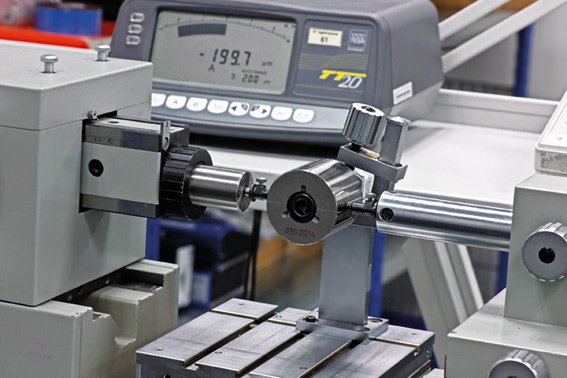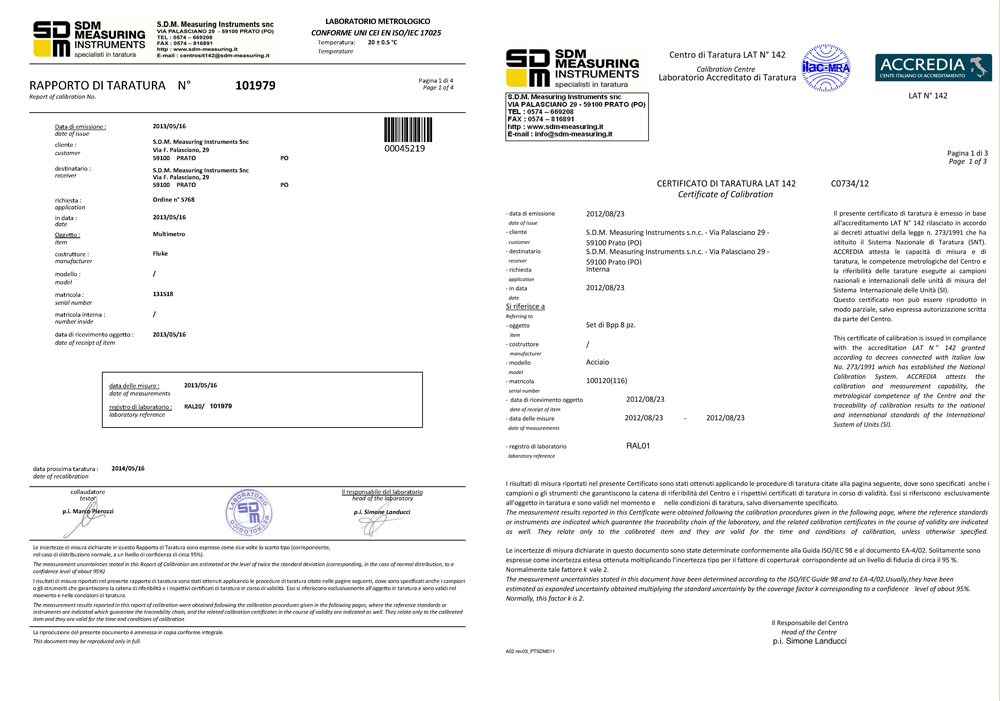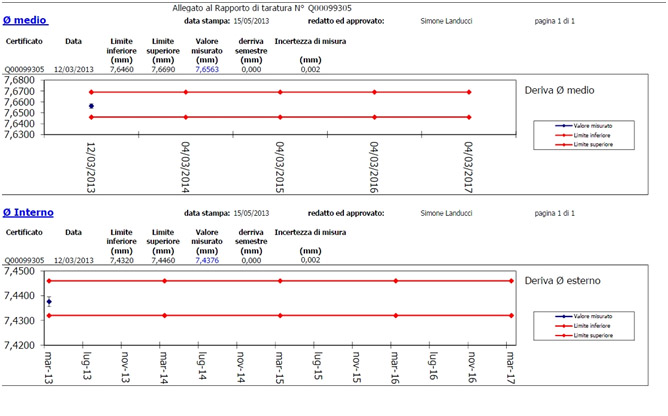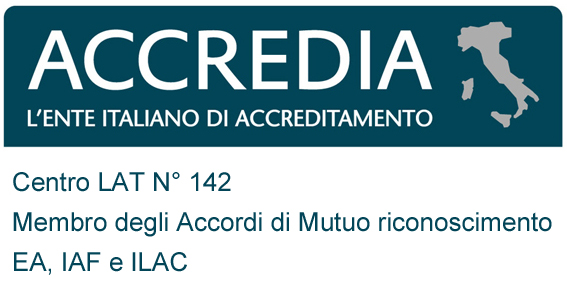FAQ
We wish to explain some of the fundamentals of the metrology industry by providing answers to the most frequently asked questions.
 Measuring instruments and gauges play an important role in a company’s production process, ensuring the suitability of products to be put on the market.
Measuring instruments and gauges play an important role in a company’s production process, ensuring the suitability of products to be put on the market.
As they play such an important role, it is necessary that the instrument is efficient and has a proportionally adequate error, depending on the tolerances of the measured workpiece, and what it has to ensure.
Since each measuring instrument and gauge undergoes a deterioration of its initial error, both through use and over time, it is essential to monitor it and ensure its error is kept under control and within certain boundaries: calibration ‘takes a picture’ of the condition of the measuring instrument at the time it is performed. This is why calibration is required. There is no obligation to calibrate measuring instruments, only a technical reason to guarantee the quality of manufacturing and metrological constancy over time.
 The term “calibration certificate” identifies the document issued by a Center accredited by ACCREDIA (official body in Italy for the accreditation of calibration and test laboratories).
The term “calibration certificate” identifies the document issued by a Center accredited by ACCREDIA (official body in Italy for the accreditation of calibration and test laboratories).
The activities related to the issue of the Calibration Certificate respond directly to both requirements of the UNI CEI EN ISO/IEC 17025: 2018 standard (General requirements for the competence of testing and calibration laboratories). ACCREDIA is the guarantor, through the approval of the measurement procedures adopted by the Centre, periodic inspections and the execution and monitoring of experimental comparisons, etc.
By carrying out these activitiers, ACCREDIA ensures that the organization of the accredited Centre is compliant with all the requirements of the abovementioned standard. The customer who combines a calibration certificate issued by an accredited center with his own measuring instrument has no further burden to prove third parties that the metrological service acquired was carried out in compliance with the provisions of the standard; in addition, the Certificate guarantees the traceability of the results it contains, without need for proof.
Calibration reports are issued against procedures approved by the laboratory that issues them. The laboratory guarantees the metrological correctness of the procedures adopted and their metrological traceability. The customer who combines a calibration report issued by a laboratory of this type with his own sample or measuring instrument has the burden – if required – of proving to third parties (in accordance with its supplier certification procedures) that the the metrological service acquired was actually carried out in compliance with the provisions of the UNI CEI EN ISO/IEC 17025:2018 standard, as well as documenting on the basis of which technical comparisons the traceability of the calibration results was maintained.
 The calibration check and its metrological confirmation must be repeated whenever it is suspected that one or more of the metrological characteristics of the equipment has undergone alterations such as knocks, falls, repairs and/or adjustments etc.
The calibration check and its metrological confirmation must be repeated whenever it is suspected that one or more of the metrological characteristics of the equipment has undergone alterations such as knocks, falls, repairs and/or adjustments etc.
In the absence of such circumstances, verification and confirmation must be repeated at regular intervals, depending on the use of the equipment.
It is possible, through monitoring the instrumental drift, to draw a graph that allows us to outline a drift curve of the instrument. This allows us, through analysis, to better define how often calibration verification intervals should be planned and the metrological confirmation to which the equipment should be subjected.
 There is often confusion about the meaning and difference between the terms “accreditation” and “certification”.
There is often confusion about the meaning and difference between the terms “accreditation” and “certification”.
“Accreditation” means that an authoritative body (organism) formally recognizes that an organization (or individual) is competent to perform a specific service as described in the purpose of accreditation. For example, ISO/IEC 17025 accreditation applies specifically prepared criteria and procedures to determine the technical competence of a laboratory, i.e. determining specific technical skills.
“Certification”, on the other hand, means that an independent third party has confirmed in writing that a product, procedure or service meets the prescribed requirements. For example, the ISO 9001 certification of a company declares compliance with the requirements of the standard (it is not linked to a technical competence) and mainly concerns general management, processes and data handling.
The difference between these two apparently similar definitions lies in the fact that, with accreditation, the formal recognition of competence is based on proven technical knowledge, and therefore requires the consultation of a technical expert for the purpose of said accreditation; certification, on the other hand, mainly concerns ensuring compliance with a given standard.
«The attestation by a national accreditation body, certifying that a given conformity assessment body meets the criteria established by harmonized standards and, where appropriate, any other additional requirements, including those defined in the relevant sectoral programs, to carry out a specific activity of conformity assessment» REG (CE) N. 765/2008
Both nationally and internationally, users require increasing guarantees regarding the quality and safety of purchased goods and services, whose producers and suppliers are called upon to guarantee, in order to comply with legislative requirements and to face competition in increasingly complex markets.
Through the certification of its management system, product or service or its professionalism, with an inspection report on its own activity or a laboratory test on the goods offered, or calibration of instruments, samples, and measuring systems used, the supplier can demonstrate to the customer that he operates in compliance with international standards and other specific requirements relating to its field of activity.
Only test laboratories, calibration laboratories and accredited certification and inspection bodies are able to provide the market (whether it be companies, the State, or consumers) with reliable, credible and internationally accepted declarations of conformity. ACCREDIA assesses and ascertains the laboratories’ competence, applying the most stringent standards of verification to their behavior and continuously monitoring their performance over time, as it adheres to International Mutual Recognition Agreements. In particular, accredited calibration laboratories disseminate the metrological reporting of the results of measurements to guarantee the quality of products and services, in accordance with national (Law 273/91) and international legislations.
Thanks to accreditation both Compliance Assessment Bodies (Laboratories or Certification or Inspection Bodies) and their customers can testify that adherence to rules is the result of voluntary commitment and not forced compliace.
Accreditation attests the quality of the work of an organism (certification and inspection) or a laboratory (testing and calibration), verifying the compliance of its management system and its skills to internationally recognised regulatory requirements, as well as mandatory legislative requirements
ACCREDIA is committed, through the implementation of its control mechanisms, to ensure the behaviour of all parts (companies, consultants, organizations, inspectors) respects some fundamental principles, which are the foundation of the credibility of certifications, and compliance claims in general, in the eyes of the user.
Accreditation is therefore a guarantee of:
- Impartiality: representation of all parts within the organisation/Laboratory.
- Independence: auditors and certification committees ensure there are no conflicts of interest with the organization to be certified.
- Fairness: European standards prohibit the provision of consultancy either directly or through associated companies.
- Competence: accreditation first attests that the verification staff is culturally, technically and professionally qualified.
Accreditation covers all sectors of production and service users face on a daily basis, as all types of activities can be assessed, from construction to energy, from the environment to transportation, from healthcare to training…
The accreditation service is a complex process that goes beyond the technical dimension of assessing the competence of Laboratories and Organizations, by pursuing objectives of general interest.
REQUEST INFORMATION
Contact us for more information or for free advice
CONTACT
commerciale@sdm-measuring.it
DIRECT-LINE
0574 669208
OFFICE HOURS
08.30-12.30 / 13.30-17.30
CONTACT
commerciale@sdm-measuring.it
DIRECT-LINE
0574 669208
OFFICE HOURS
